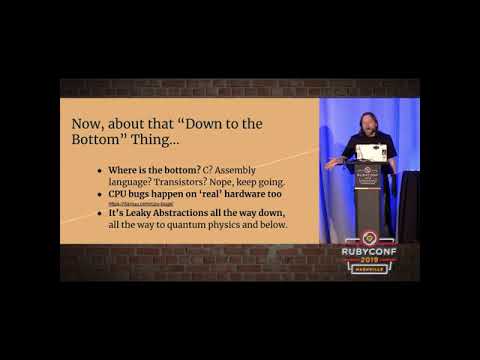Let’s see how this goes…
Great podcast episode about this history of blogging:
https://daringfireball.net/thetalkshow/2023/03/11/ep-370
John also talks about the stability of Sinatra for a one-time Ruby project he created that is still running and hasn’t touched since.
Discourse is being used as a test repository for YARP. ![]()
We’re getting very, very close on YARP being able to parse all of our test targets perfectly.
ruby/ruby - 7737/7848 = 98.59%
rails/rails - 3061/3083 = 99.29%
discourse/discourse - 4408/4434 = 99.41%
I joined Discourse around the same time Hawk did and it’s great to see her in the wild doing an interview as a Co-CEO now!
New 3.1.0.beta3 discourse release is out!
I couldn’t have stumbled upon this talk at a more appropriate time. I often feel like I should be investing time in understanding the computer all the way to the bottom, so this talk was very refreshing in that it was giving me permission to not write that operating system.
I still think there is value in going deep though, but going deep in your current domain. Like learning some of the internals of Rails, Ruby, Puma, or some other tool you depend on and use daily.
https://codefol.io/posts/isnt-there-one-final-machine-language/
Sharing ideas - not just tips, but thoughts about the why and who behind technology, as well as being vulnerable in public - has let me cut through from being a nobody in Edinburgh to someone with a pretty great technology career in SF.
And even if none of that had happened, writing is a wonderful way to structure your thoughts, consider what really matters, and reflect.
I recommend it. Start a blog - on your own domain, on webspace that you control.
https://twitter.com/jimkchin/status/1637212347646263297?s=20
Every time I look at this photo I think about how this moment before the crux must have been so much worse than actually climbing through it. @AlexHonnold chalking up… 2,000 feet up El Cap without a rope, contemplating the shitty holds on the Boulder Problem.
The value of reading, and of writing things down that we read, or hear, cannot be overstated. Two expert guests (who specialize in speech and memory) on the Huberman Lab podcast explained that when we read text or listen to something and then write key aspects/takeaways down by hand- not typing, it engages our motor control centers in ways that deeply embed that information to our memory. Taking notes, however cursory, turns out to be the best way to remember and implement information later.
![]() https://twitter.com/hubermanlab/status/1637528748042977282?s=20
https://twitter.com/hubermanlab/status/1637528748042977282?s=20
Never underestimate the power of copy
The copywriter behind Slack’s update jargon deserves a monumental raise
In 1975, Sylvester Stallone wrote the screenplay for “Rocky.” He shopped the script to every producer and studio in Hollywood, but he was repeatedly rejected. Eventually, one production company, Chartoff-Winkler Productions, expressed interest. But there was one condition… They didn’t want Stallone to play Rocky. They wanted a “more marketable actor” for the leading role. In fact, they were so desperate for Stallone to not play Rocky that they kept offering him increasingly large sums of money to go away. “It went up to $360,000,” Stallone said, “to go away, to ‘get off my lawn boy.’” Stallone didn’t take the money for 2 reasons. 1) “I had about $106 in the bank,” Stallone said. “But I had managed poverty very well. I had it down to a science. I really didn’t need much to live on.” “But more than that…” 2) “There was something about the idea of unrealized dreams,” Stallone said. “I knew that if I sold it—even for $500,000—I knew that after the money was gone, I would have become very bitter if I never realized my dream.” Takeaway 1: Stallone turned down the huge sum of money because he feared the bitter person he would become if he never went for his dream. The screenwriter @briankoppelman talks about why, after many years of being afraid to, he finally started writing: “What I finally realized was that if I allowed these creative impulses to die, it would be like a real death, and like any form of death, it would be toxic and this toxicity would ooze out of me onto everyone and everything.” Takeaway 2: Stallone turned down the huge sum of money because he had “establish[ed] business relations with poverty,” as the Stoic philosopher Seneca put it. “The trick is,” Tom Rothman (CEO of Sony Pictures Motion Picture Group) says, “to be fiscally responsible so you can be creatively reckless.” — "If you don’t take money, they can’t tell you what to do, kid…Money’s the cheapest thing. Liberty, freedom is the most expensive.” — Bill Cunningham
![]() https://twitter.com/bpoppenheimer/status/1638603813165707264
https://twitter.com/bpoppenheimer/status/1638603813165707264
| Rank | Ranked 2022? | Name | Absolute Growth | Compound Annual Growth Rate | Revenue 2021 ($) | Revenue 2018 ($) | Employees (2021) | Category | Founding Year | City | Country | Listed on Stock Exchange |
|---|---|---|---|---|---|---|---|---|---|---|---|---|
| 350 | No | Discourse | 120% | 30% | 9,980,105 | 4,531,342 | 57 | IT & Software | 2012 | Dover | US | No |




